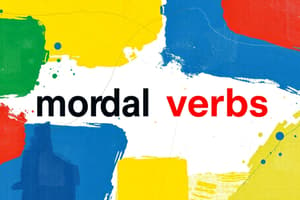Podcast
Questions and Answers
Which statement correctly uses the modal verb 'should'?
Which statement correctly uses the modal verb 'should'?
Which sentence indicates a strong obligation using 'must'?
Which sentence indicates a strong obligation using 'must'?
Which example correctly demonstrates the use of 'could'?
Which example correctly demonstrates the use of 'could'?
Which statement illustrates the use of 'can’t' for deduction?
Which statement illustrates the use of 'can’t' for deduction?
Signup and view all the answers
Which option reflects a possible future outcome with 'might'?
Which option reflects a possible future outcome with 'might'?
Signup and view all the answers
Which statement best expresses a suggestion to someone feeling unwell?
Which statement best expresses a suggestion to someone feeling unwell?
Signup and view all the answers
Which statement implies a prohibition regarding excessive gaming?
Which statement implies a prohibition regarding excessive gaming?
Signup and view all the answers
Which option indicates a possibility based on someone's past actions?
Which option indicates a possibility based on someone's past actions?
Signup and view all the answers
Which statement suggests uncertainty about someone's academic efforts?
Which statement suggests uncertainty about someone's academic efforts?
Signup and view all the answers
Which statement correctly conveys an assumption about a person's presence?
Which statement correctly conveys an assumption about a person's presence?
Signup and view all the answers
Study Notes
Modal Verbs: Usage and Meaning
- SHOULD/SHOULDN'T: Expresses advice or obligation. Used for recommendations and suggesting what is appropriate.
- MUST/MUSTN'T: Expresses strong obligation or prohibition. "Must" indicates necessity or strong inference. "Mustn't" expresses a prohibition.
- COULD/COULDN'T: Expresses possibility or impossibility in the past. "Could" indicates past possibility, while "couldn't" indicates past impossibility. Implies a hypothetical or potential action in the past.
- CAN'T: Expresses strong impossibility or certainty that something didn't happen. Implies a very strong contradiction or negation.
- MIGHT/MAY: Expresses possibility in the past or present. Implies a lesser degree of certainty than "must" but more than "could."
Studying That Suits You
Use AI to generate personalized quizzes and flashcards to suit your learning preferences.
Description
Test your understanding of modal verbs such as should, must, could, and might. This quiz covers their meanings, uses, and implications in both present and past contexts. Perfect for learners looking to enhance their grasp of English grammar.




